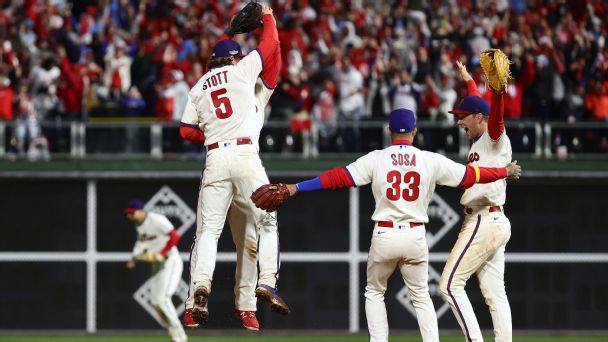
PHILADELPHIA — The baseball gods wasted no time in giving Philadelphia Phillies boss Rob Thomson his first big managerial moment in the Fall Classic.
Five months after taking over from the fired Joe Girardi, Thomson had already navigated the Phillies’ underwhelming end to the regular season and three challenging rounds of the postseason, including a three-game wild-card series that no manager had ever faced. Now, in Game 1 against the heavily favored Houston Astros, Thomson had a quick decision to make.
After going down 5-0 early, his team had just tied the game in the top of the fifth inning. Starter Aaron Nola, normally one of Philadelphia’s aces, was at 81 pitches already, and clearly struggling — but going to the bullpen after just the first 4.1 innings in a best-of-seven series was plenty risky, too.
Thomson picked the risky move.
He put in closer Jose Alvarado, who secured the final two outs of the fifth and the first of the sixth. But the 58 year old manager wasn’t done — he would use four more of his best relievers to ensure his team held on for a 6-5 road win.
“He has the pulse of it,” Phillies President Dave Dombrowski would say the next day. “And he has my support.”
It was just the latest example of the deft touch Thomson has shown during his first year managing the Phillies — though his biggest moments are undoubtedly to come as his team attempts to stay alive in the World Series, trailing 3-2 heading into Game 6 on Saturday night in Houston.
His message to the team could very well be one he’s told to himself about his own career. After all, this was not a man on the fast track to managing.
“I don’t think there’s any reason to panic,” Thomson said on Friday. “We just have to keep doing what we’re doing and concentrate on doing the little things. I always tell ’em, focus on the little things and big things will happen.”
Big things happened for Thomson in June, and they keep on happening well into October.
He’s already earned a two-year extension after just a partial season on the job. But while Thomson’s sure-footedness might seem preternatural, it’s actually been honed by years on coaching staffs, including six years as the bench coach for the Phillies and Yankees before that.
In fact, when Thomson took over for Girardi, it was not his first time being considered to lead the Phillies. Two years before, when manager Gabe Kapler was fired, the organization considered then-bench coach Thomson for the job before coming to a mutual decision not to interview him.
“When we were hiring before Joe, we talked to him about taking the job,” Phillies owner John Middleton said. “And he said no. He said I don’t think I’m the person for it. I think you should go out and get someone else.”
It was pure Thomson, who, according to those that know him best, has never politicked for a promotion.
“I agreed with them that they needed an experienced guy,” Thomson said.
So instead of taking the job, Thomson helped the front office in picking Kapler’s successor. But after Girardi brought a buttoned-up approach to the clubhouse, Middleton and Dombrowski knew they wanted something different — and who they wanted for it. It was Thomson’s time — at least they hoped it would be.
“When Dave started talking about this move in May,” Middleton recalled, “I said to him ‘I don’t know if he’s going to take the job.’ He didn’t feel he was the right guy for it (last time), which obviously (turned out to be) an incorrect evaluation.”
So why was Thomson open this time to the possibility of taking a job he had previously turned down?
“Different circumstances,” he said.
What might have been wrong in 2019 suddenly seemed right. The team wasn’t winning under the tightly controlled atmosphere with Girardi at the helm. A looser grip — in exchange for a lack of experience — turned out to be the right call.
“We didn’t have everyone feeling the best versions of themselves and when Thomson was able to come in, with no pressure on him, he just went out and let baseball be played,” right fielder Nick Castellanos stated.
But still, a World Series run — even a playoff run — were no sure thing, especially when Thomson took over the 22-29 team.
“You never know how a guy is going to react until he gets there,” Dombrowski said.”He’s handled everything as smooth as can be. No situation has been too big for him. He’s kept that even keeled nature going. You can’t ever anticipate that calmness.”
With Thomson, though, you could come close. ‘Even-keeled’ is used to describe him so often that it might as well be his first name. It’s something he’s learned over years in the dugout, and it’s come in handy as the stakes have gone up throughout the postseason.
“I think earlier in my career, I was not as even-keeled as I am now,” Thomson said. “You kind of learn these moments and know that you can’t control things and so why worry about certain things. I think just the experience of going through all these different moments throughout a 30-some-year career just kind of teaches you to be even-keeled.”
His players agree: Time in the dugout matters, they say, even if it’s not as the man in charge.
And Thomson has been at it for decades, coaching in the minor leagues for the Tigers and Yankees before becoming Girardi’s bench coach in New York in 2008. Then to the Phillies for the same job under Kapler in 2018.
“With him comes a lot of experience, a lot of big games, a lot of managing superstar players, just every step that he’s been,” Phillies third baseman Alec Bohm said. “So I think when he took over he was definitely ready. To me, it didn’t seem like there was any growing pains or anything with that.”
Current bench coach Mike Calitri added: “He is the most prepared human being I’ve ever been around…His ability to be placid and calm exudes through the whole team.”
Calitri is the sounding board for Thomson in games. He’s the voice behind the manager. He was also part of the thought process into being aggressive with the bullpen in Game 1.
“We felt some momentum after having scored,” Calitri said. “If that momentum shifts back, it’s probably not good for us.”
Thomson concurred, creating an early narrative that would set the tone for his Fall Classic performance: Worry about today and let tomorrow take care of itself.
“In these seven-game series, where you have 2-3-2, you’ve got that day off, two days off, potentially, and so you can use guys a little bit more,” Thomson said the day after Game 1. “If we start the season next year, I can tell you I won’t manage like this because it’s a marathon. This is a sprint now and we have to go for it every day.”
As it turns out, the strategy was further rewarded when rain postponed Game 3 giving Thomson’s bullpen another day of rest.
Of course, not every high-risk move is going to work out. In Game 4, Thomson pulled Nola with the bases loaded and no outs in the fifth inning, again for Jose Alvarado. This time, though, Alvarado hit the first batter to give up the lead, and the Astros went on to score five runs in the inning, eventually tying the series, 2-2.
But win or lose, Thomson is that same, calming presence in the locker room — as he was after that Game 4 loss, which saw the Phillies no-hit for only the second time in a World Series game.
“I walked in the clubhouse … and I just basically told them to flush this,” Thomson said. “It’s gone.”
Then he left, giving his veteran club the space to absorb the moment, pretty much the same way he’s done it since June. That laid back style is part and parcel to who he is — steady, calm and prepared.
And so far, his success in the job has proven the wait has been worth it — for him and the team he’s managing.
“We’re all grateful for the opportunity to play for him,” Bryce Harper said. “We all want to go out there and play our best game for him, and he just has all the faith in the world in our ability to go out there.”












